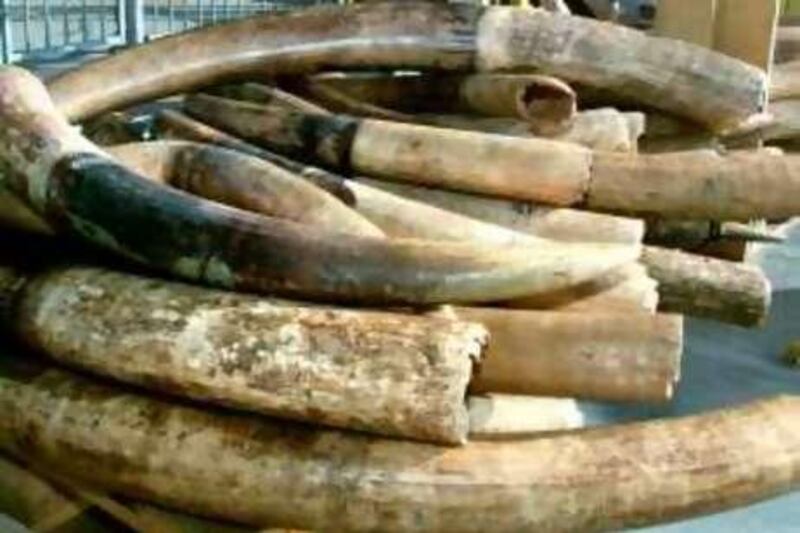ABU DHABI // The number of smuggled wild animals, birds and pieces of ivory seized at UAE customs has tumbled dramatically since the Government began clamping down on the illicit trade in 2002. Customs officers who confiscated hundreds of species and tonnes of ivory a few years ago are now finding only a few bits of ivory and far fewer birds and animals.
"Smuggling still happens but the numbers have dropped a lot," says Abdulrab al Hemeri, a senior Federal Environment Agency official involved in enforcing the ban on illegal trade in animals and protected products. Lisa Shake Perry, a senior official with WWF, said: "The improvement in the UAE over the past couple of years has been incredible, it's been dramatic." The Convention on International Trade in Endangered Species of Wild Fauna and Flora (CITES) came into force in the country in 2002, but illegal trade remained prolific as people were not aware of the legislation, or ignored it.
"In 2002, 2003 and 2004 we used to confiscate literally tonnes of ivory a year, we have still big warehouses full of it, thousands of tons," said Mr Hemeri, assistant manager for CITES at the agency. Last year only three pieces of ivory were seized at UAE airports, he said. Before CITES there were no restrictions on the trade of wild animals or products such as furs and caviar. Now the convention gives varying degrees of protection to more than 30,000 species of animals and plants, whether they are traded as live specimens, fur coats or dried herbs.
"After introducing the law people still didn't know much about it or take it that seriously," Mr Hemeri said. "Our main priority was to increase awareness among the public, government and customs workers. Last year just seven unlicensed falcons were confiscated by customs officials. That compares to about 20 in 2006 and at least 100 a year in the first few years after the new laws were introduced."
The ease in obtaining licences to transport the birds legally has helped reduce the number of confiscations. Deterrents such as legal action have also made an impact. "Falcons used to be a big issue until we started taking people to court and people started to get punished for illegal trade," Mr Hemeri said. "People here love falconing so much that if it takes paperwork and permits they'll make sure they get it."
Mr Hemeri estimated that the number of animals seized by customs dropped by about a half from 2006 to 2007. He hopes the figures will fall again this year. African Grey parrots, cockatoos and tortoises from Iran and Syria remain the most commonly confiscated species. Still, according to Mr Hemeri there has not been a particularly large haul for the past couple of years. The UAE's strict enforcement of the rules may mean that smugglers are now shipping illegal goods through other countries, where laws are more lax. CITES only came into force in Oman this year and Bahrain has yet to sign up.
"CITES secretaries have always viewed the UAE as a best case example for the region. They took the laws seriously and enforced them," said Ms Shake Perry, the project manager for CITES at the WWF. "Illegal traders are probably finding alternative routes. The UAE wasn't necessarily the stopping point. It was coming through but not necessarily staying." Seizures have dropped despite the fact that officials at airports and ports are now better trained to identify banned species. The WWF and Environment Authority have been working in partnership on training projects to educate customs workers on how to spot illegal goods and will soon distribute the first identification guide in Arabic.
"Customs is the first and last defence. If it goes through customs then nobody else is going to catch anything," Mr Hemeri said. The smuggling of wild animals and goods derived from endangered species is the third biggest illicit trade in the world, after drugs and weapons. "I think every country in its own right is struggling to do they best they can," Ms Shake Perry said. "It takes a little bit of time.
@Email:lmorris@thenational.ae





